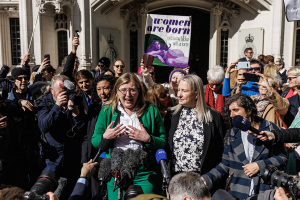Convert from Islam in Sudan Loses Wife, Children
Faith in Christ leads judge to annul marriage, forbid seeing kids
KHARTOUM, Sudan – A year ago Mohammed Khidir Khalil was glad his family had obtained refugee status in Egypt after fleeing Islamic hostilities in Sudan.
The 38-year-old Christian was also heartened that his formerly unbelieving wife was attending church with him.
Today the convert from Islam is back in Sudan fighting to recover his family after his in-laws compelled his wife to claim she was Muslim and divorce him. A Sudanese court automatically granted her custody of their two sons and forbade him to see them, he said. He fears that if he persists in his legal battle, he faces the threat of being accused of "apostasy," or leaving Islam.
It was last August that his Muslim mother-in-law visited them in Egypt.
"Without my knowledge, she took my wife and children back to Sudan," Khalil said.
The couple had fled Sudan just before the South Sudan vote for independence on Jan. 9, 2011, after threats from the couples' Muslim families and others intensified, Khalil said. In Egypt, they reported their case to the U.N. High Commissioner for Refugees (UNHCR) and won asylum.
In emails to friends back in Sudan, Khalil freely shared his Christian experience and pointed out what he termed as contradictions in Islam.
Hearing nothing from his family after his mother-in-law took his wife and two sons back to Sudan, on Christmas Day Khalil decided to return to an undisclosed town in Sudan to search for them. He was shocked to discover that his wife, Manal Hassan, had filed for divorce on grounds that she was a Muslim and he a Christian.
Khalil, who converted to Christianity in 2001, had met Hassan in 2007. At that time she said she was neither a Christian nor a Muslim, and they married in a non-religious wedding. The bride's Muslim family learned that Khalil was a Christian but had no objection to the marriage, he said.
By 2010 the couple had joined an undisclosed church and had become visibly active in it; opposition from their families grew, leading to the couple's flight to Egypt in early 2011.
Last February, Khalil decided to appeal the divorce ruling. His wife had presented a copy of the UNHCR certificate showing Khalil's testimony as a Christian, however, and that was proof enough for a judge to rule in March that the marriage be annulled and the children automatically handed over to the spouse professing "the popular religion" – Islam, the supposed faith of Hassan.
In spite of the court's ruling that Khalil did not have a right to even visit the children, in April he decided to try to see them. His former wife's family threatened to call police if he persisted.
"I am very upset with courts like this that bar one from seeing one's children," he said. "I have to appeal against this."
Asked what risks he might incur by appealing, Khalil said it could lead to a case against him for apostasy – punishable by death in Sudan, where sharia (Islamic law) is established as a primary source of legislation.
"They might take the case to a prosecution court, which might lead to my sentencing to death according to Islamic apostasy law – but I am ready for this," Khalil said. "I want the world to know this. What crime have I done? Is it because I became a Christian? I know if the world is watching, they will be afraid to do any harm to me."
Conversion
Khalil was a practicing Sufi Muslim when he began studies at a university in Alexandria, Egypt, in 1998. By the time he graduated in 2000, he had left Islam; he returned to Sudan an atheist.
After his return to Sudan, Khalil came into contact with a U.S. pastor who inspired him with his Christian faith.
"He was very calm and confident," Khalil said.
He recalled that the pastor made reference to the Nubian people of southern Egypt and northern Sudan calling themselves "sons of the Nile," the river being considered the source of life, and connecting that idea with the Son of God likewise coming from God as the source of all life. References to Jesus as the Good Shepherd whose Father was the God of love also moved him. Khalil decided to visit the pastor's church, and he entrusted his life to Christ in 2001.
He stayed with the pastor for three months before he left to his home village. The pastor paid him visits, and when his family realized that Khalil had embraced the Christian faith, his father threatened to shoot him. Khalil fled home.
He was later baptized in a historically Nubian area near his home village. Khalil began winning friends to Christ, and persecution intensified; family members reported him to the police, and he fled his country.
"Life became unbearable, and I decided to flee to the United Arab Emirates, where I was received by a Sudanese family in 2001," he said.
He remained there until the signing of the Comprehensive Peace Agreement between north and south Sudan in 2005, and then decided to return to Sudan with the hope of serving his community. He became an English teacher, at the same time developing programs to promote Nobiin, one of the Nubian languages, and its cultural heritage. Building a literacy program for children in Nobiin, he also wrote poetry in the language and translated several hymns and Bible verses into it.
Along with his other challenges, Khalil is working toward publishing his sundry manuscripts in the Nobiin language, in spite of financial constraints. A deacon at his church summed up: "Mohammed needs prayers and support at this trying moment."





























